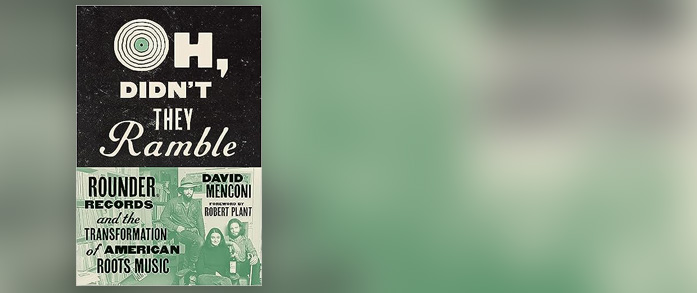
When the definitive history of bluegrass music is written, Rounder Records will play a sizable role, and deservedly so.
The label was at the center of many key events since its founding in 1970, from the recording of J.D. Crowe & the New South’s seminal recording (known affectionately by its label number, Rounder 0044) to the discovery of Alison Krauss. The numbers speak for themselves: More than 4,000 projects, 56 Grammy Awards, and millions of dollars in sales.
But now that the history of Rounder Records has been written, authoritatively and comprehensively by music journalist David Menconi, it is shockingly clear how close Rounder came to never getting off the ground. The trail of what-if breadcrumbs are scattered throughout Menconi’s Oh, Didn’t They Ramble; Rounder Records and the Transformation of American Roots Music (University of North Carolina Press).
What if Ken Irwin and Bill Nowlin, who became two of Rounder’s three founders, hadn’t been randomly paired as roommates at Tufts University in the mid-1960s?
What if, on a summer day in 1967, Ken Irwin had chosen to read a best-selling book instead of one about the blues? Would Marian Leighton, who became the third Rounder founder, have approached him to ask a charming question: Are you talkable?
What if Irwin and a girlfriend hadn’t been picked up by Ken and Sherri Davidson while hitchhiking back to New England from Galax later that year. Irwin and Davidson, founder of Kanawa Records, talked music at length. According to Menconi’s tireless reporting, Irwin called Nowlin and said, “This guy doesn’t seem to know much about putting out records, but he’s doing it anyway. Why don’t we?” Looking back nearly 60 years later, Irwin answered his own question: “There was no one to tell us not to, so we did. That was the beginning of Rounder Records.”
Fortunately, for all of us and the music we love, Irwin and Nowlin did become roommates, Leighton discovered that Irwin was talkable, and none of three knew any better, so they started their independent record label. As Jerry Douglas put it years later, “Who knew that three Yankee socialists could start a traditional music record company?”
Also fortunate is that Menconi chose to devote his reporting and writing skills to preserving the story while most of the major players are still able to tell it.
Menconi’s narrative is told in a largely linear fashion, from the early days when Rounder didn’t even offer contracts to their artists, to the 2010 decision by the founders to sell the label to the Concord Music Group and the eventual dramatic shift away from CDs to the streaming of individual songs.
The author’s background as a reporter is evident in his richly detailed presentation of the facts he uncovered through research and countless interviews. As someone who loves granular, detailed reporting, I found gems from Menconi in nearly every chapter.
One of my favorites is that Leighton, later known by her married name Marian Leighton Levy, only spent 11 cents on the backside of a long hitchhiking trip with Irwin – “a doughnut for a dime and a stick of gum for a penny.”
Another is his account of Pete Wernick telling Irwin in 1971 that the label and his band should have a contract. Irwin found a piece of paper and wrote Rounder’s first contract on the spot. It said, simply, “fifty cents a record.”
But the best one of all, in my book, is the telling of Irwin falling in love with the voice of 13-year-old Krauss in 1985. He wasn’t just listening to demos. He was listening to demos on the deck above his garage, wearing a bathing suit and a ball cap and sipping lemonade.
Such attention to detail doesn’t tell the whole story, of course, but does help bring the story to life. Mark Twain once wrote, “Don’t say the old lady screamed. Bring her on and let her scream.” Menconi brings on the founders, key artists, hangers on, and others and lets them have their moments across 180 pages.
From their naïve start in 1970 to their induction into the Bluegrass Hall of Fame in 2016 and beyond, Irwin, Leighton Levy and Nowlin were guided by one principle: Do we like it? It allowed them to grow their little label beyond bluegrass into a major force in recorded music.
As Rounder grew, so did bluegrass.
“They really were the label of choice for bluegrass, where everyone wanted to be,” Bluegrass Hall of Fame member Dudley Connell told Menconi. “The early acts they signed – Joe Val, J.D. Crowe, Tony Rice – (were) pretty much a who’s who of bluegrass. They also had better production, better covers. They really raised the bar for bluegrass records and distribution.”
Oh, Didn’t They Ramble tells an important story in an entertaining and informative way. If you only read one book about music this year, this should be the one.







